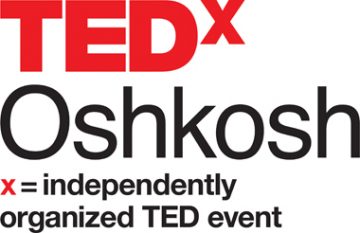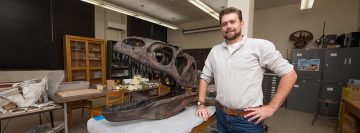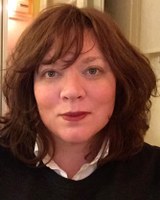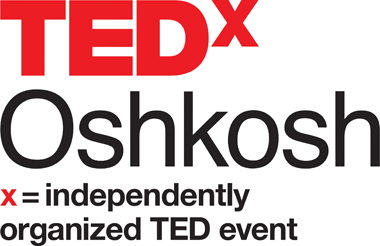 University of Wisconsin Oshkosh expertise is helping fuel TEDxOshkosh, planned next month at The Grand Opera House.
University of Wisconsin Oshkosh expertise is helping fuel TEDxOshkosh, planned next month at The Grand Opera House.
The second annual TEDxOshkosh event takes place Saturday, Nov. 4, at 100 High Ave., Oshkosh, with 14 talks that touch on climate change, the internet, music, politics and many other topics with a twist. The event features timed live speakers who spark discussion and connection with their audiences.
Cars and fossils
Joseph Peterson, associate professor of geology at UW Oshkosh, will mention cars and fossils in the same presentation. In T. rex and T-Birds: Patterns of Evolution by Automotive Analogy, Peterson will examine biological evolution over geologic time seen by analogy through trends in the automotive industry.
“The subject of my talk is observing patterns of evolution in technology,” he said. “While technological ‘evolution’ is not the same as biological evolution, there are some fun similarities that we can use to help us better understand biological evolutionary patterns.”

Peterson is known for conducting research in vertebrate paleontology. He earned a doctorate at Northern Illinois University in 2010 and has studied dinosaur preservation and behavior in the rocks of Utah, Montana and Wyoming.
“The take-away message I hope people get from my TEDx talk is that biological evolution, which is the cornerstone of biology and paleontology, isn’t some foreign concept—it constantly surrounds us in our everyday lives,” Peterson said. “We can use the familiarity that we have with technological advancements to help us understand the diversity of life on earth through time.”
Politics and food
Tracy Slagter, associate professor of political science at UW Oshkosh, will present No Such Thing as a Free Lunch: Politics for Eaters.
Tracy SlagterSlagter says not many people these days like talking about politics. The presentation will approach the topic of food as a possible springboard for productive political conversation.
“My talk is about the intersection of politics and food, and really speaks to a shift in thinking about both that occurred since I’ve been teaching my ‘Politics of Food’ course here on campus,” she said. “After the talk, I want people to think about the food that is on their plates a little differently, and realize that government has impacted every food choice they’ve made, for better or for worse. And I want them to come away with a slightly altered attitude toward politics more generally, one that makes politics seem more constructive than destructive. I’m grateful that the TEDx organizers scheduled my talk for right before lunch!”
Slagter received a doctorate in political science from the University of Iowa in 2006 and has taught a wide array of courses on European and European Union politics, environmental politics, food politics and international law.
“I suspect that everyone who gives one of these talks initially thinks that they have nothing interesting to say, but of course that’s not true,” she said. “We all have a unique way of seeing some aspect of the world, and TED talks help to uncover some of those insights.”
Other members of the speaker lineup are Javad Ahmad, who will speak on The Internet of Everything; Ken Arneson, The Future of Aging; Atiba Ellis, Using Memes to Break Out of Voter Fraud Talk; Sharon Hulce, The Story of Courage: Lessons from the Wizard of Oz; Charlie Krebs, Everyone is a Performer; Curt Kubiak, Manufacturing Healthcare; Nina Maybe, Radical Vulnerability: Choosing Authenticity as an Act of Resistance; Matt McVeigh, What Can Musical Performance Teach Us About Servant Leadership?; Jonathan Patz, Climate Change is Affecting Our Health. Is There a Cure?; Carl Reible III, Family Dairy Farms: Drawing from the Past, Looking Towards the Future; Tracey Robertson, Black Girls Aren’t Magic; Nancy Yarbrough, Myths, Misconceptions, Mysteries and Mistakes…of the Sex Trade
TEDx-style duplicated by students
Christine Roth, director of the UW Oshkosh department of English graduate program, is incorporating TEDxOshkosh as part of this semester’s Honors Advanced Composition class. Roth is directing students to finish the semester with a public TEDx-style talk instead of a traditional academic essay.

“Unlike traditional student essays, TED and TEDx talks are written for and delivered in front of an audience,” Roth said. “Students must shape their argument for a specific audience’s interests, needs and knowledge base, and they are immediately accountable for the views that they express.”
Roth’s entire class plans to attend TEDxOshkosh event. She hopes the experience will help foster a lifelong pursuit of knowledge in her students and teach them how to do their future jobs better and to live more curious, engaged and interesting lives.
Beginning conversation
Craig Burnett, TEDxOshkosh co-organizer, said it’s important that TEDxOshkosh “starts conversation or a thought process” on a wide variety of topics. He noted that people who go to TED events are curious individuals who like to learn things and are very open-minded.
“They look forward to listening to ideas they may not be used to,” Burnett said about topics that may be outside one’s comfort zone—“but not in a scary way.”
TEDxOshkosh organizers say the event mission is simple: spreading ideas.
“It’s fun to bring new ideas to the stage in a 134-year-old beautiful theater (The Grand Opera House),” Burnett said.

